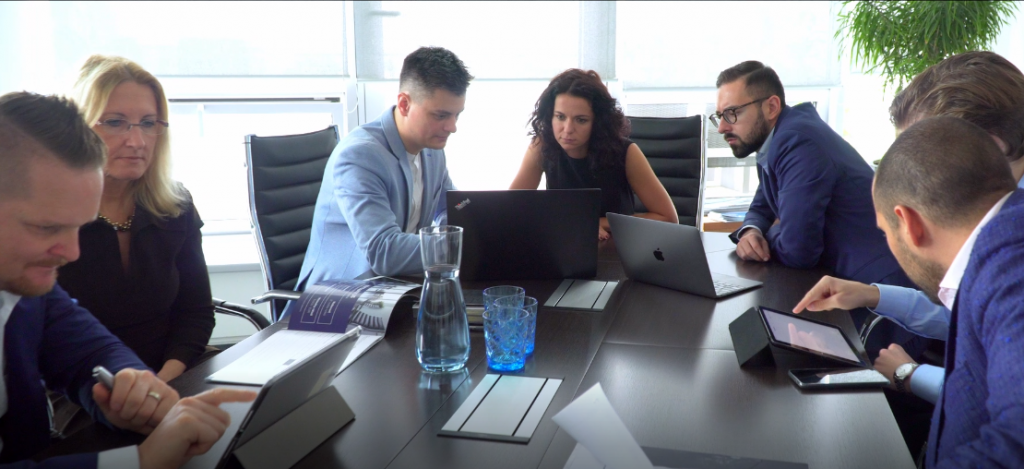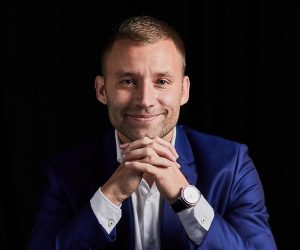Character, integrity, trust, drive and vision: How Peter Stadler selects people for the Wealth Effect Management team

“Surrounding yourself with the right people means absolutely everything. Who are the right people for WEM, then? Those who can carry and further develop our vision and find themselves in it. For such people the door is always open and they will receive more trust and possibilities than they expected — as well as more responsibility and faster than they hoped for.”
Peter Štadler
https://youtube.com/watch?v=7MsfUj0n6o4
Peter Stadler — Founder, CEO and Chairman of the Board of Wealth Effect Management in an interview about people, their character and selection, mistakes when hiring new employees and on how the composition of your team directly influences how you can(‘t) accomplish your vision and change the world.
Many companies are seemingly built on one strong representative and the media are filled with their stories. What’s the truth about that and how does it look inside Wealth Effect Management?
Even the greatest visionary can’t accomplish his or her ambition alone — and “self-made man” is essentially a harmful myth. It’s certainly attractive to let yourself get carried away with stories of exceptional individuals and think they accomplished all of it by themselves and that maybe we’ll be able to do the same.
In fact, behind every Steve Jobs and Elon Musk there are hundreds and thousands of people who turn their vision into everyday reality. That might not make for very popular stories, but that’s the truth. And it’s the same for us in WEM. I might be the one who’s creating, upholding and developing its vision, but I wouldn’t go very far without the whole team.
Why do you think it’s key to surround yourself with good people?
Because you alone can’t be good at everything. And it’s useless to attempt it. Surrounding yourself with good people is equally important in your private and your professional life. Such people can not only create a shield for you and have your back, support you — they are also the people who motivate you, push you further, they help you see things from a different perspective, they complement your qualities and capacities. In the end result you help each other to increase your output and results far beyond what you would otherwise have been able to accomplish alone.
To surround yourself with good and right people means absolutely everything.
When you say “good people”, different people can define it in different ways. What’s your definition?
There are several different layers and ways to define this. On one hand there’s of course the professional level — skills, acquired experience and how all of this complements the skills and needs of your team and yourself.
On the other hand, though, there’s the personal, human level — and this can be way more important. For me personally it always means to look, in the very first place, for honest people. People with good character and shared values who can carry on and strengthen our mission and contribute to it.
This doesn’t necessarily have to mean people you always agree with about everything. Quite the contrary, in fact. With many of the people close to me we actually have fairly different opinions, something very vigorously so. But, in the end, this is precisely what pushes all of us forward so much: we don’t have to share the same opinion, but we share the same values and vision.
That’s why I can trust such people. I know they don’t tell me what I want to hear, and I know there’s no ego, personal opportunism or manipulation in our interactions. This removes a huge burden and a great deal of attention and effort we all would otherwise have to dedicate to these politics and power games. Thanks to this we can then all focus more on fulfilling our vision instead. One way or another, we have taken upon ourselves ambition which — best case scenario — requires lifelong, intense effort from great many people. Therefore, it’s not very much compatible with exhausting ourselves with various games, intrigues and internal fights.
You speak a lot about character, integrity, honesty. Aren’t those fairly rare virtues these days?
They are, and it’s not easy to find such people. At the same time, there’s no other way for us at Wealth Effect Management. Financial market here in general and here in Slovakia in particular has a very bad reputation as it is and the only way to change it is to try and do it with the best people possible.
But the good news is that not only such people do exist, they are also willing to join us. During the last year only we’ve managed to hire several new people, both at the junior and the senior level.
Some junior-level people nowadays have a strong sense to affiliate themselves with a great and valuable goal and leave behind a legacy.
And many senior-level people have reached the stage where they no longer have to toil to secure their careers and families and are searching for a valuable and meaningful vision aligned with their values which they could support.
So how does the presence of good people in the team help WEM’s mission?
Outwardly it complements our capacities, improves the quality of our products and services, inwardly it makes people support and improve each other. All of that dramatically multiplies our output — what and how much we’re able to do, bring, create and change.
In short — good people are a chance and a hope that we’ll actually really be able to accomplish our vision.
From the other side — how does the lack of good people threaten this mission?
Good point of view, one we should employ more often.
Short-term — bad people, or the lack of the good ones, has a cascade effect influencing absolutely everything: bad atmosphere, spread of bad habits, stagnation, people falling into narrow and selfish focus on only their benefits.
Nothing valuable at all can be created in such a toxic environment and it can destroy even a great and noble mission. Not for nothing it’s said that one bad apple can spoil a basketful of good ones.
How would you describe the people currently working for WEM?
They understand our vision and can find their own place within it and they share the same DNA. They are people who constantly work to improve themselves and use their skills and abilities for valuable goals. They don’t only look out for their own personal benefit and they understand that as a whole we can accomplish a great, great deal more than we’d be able to do alone.
How did the character and composition of the WEM team change over the course of years?
The essential character hasn’t changed, we’re still guided by the same vision and DNA. The longer and more thoroughly we follow it, however, the clearer it is — for everyone concerned — what is and isn’t compatible with it, and what isn’t compatible with it at all.
Hand in hand with that the composition of our team changes. Some people have been with us for years now and they grow and mature together with the company. With others we have parted our ways and others came and took their place, it’s a natural development.
How did your own perspective regarding hiring new people change during the years that you lead your own company?
It changes just like I’m changing. First and foremost I feel a lot greater responsibility for every decision to bring anybody new into the company. It is a commitment and responsibility towards the company as such and its vision, it’s a responsibility towards its current employees and of course it’s also a responsibility towards the applicants.
Therefore I always try to be as honest, transparent and authentic as I can towards the people. If we are to work next to each other at the intensity WEM requires, there really isn’t any other way. At the same time, after all those years I dare to say I can assess people’s qualities and potential a whole lot better.
How then do you select people today compared to how you used to select them before?
In the past when I myself have been younger and less experienced I often went for quantity instead of quality. We were hiring a lot of junior-level people which not only meant a lot of demanding and lengthy training but also a great fluctuation.
Today I’m a lot more sensitive about the fact that such a thing would significantly slow down our progress and development and — as a result — we focus more on hiring senior-level people.
What did you yourself learn during the years of selecting and hiring new people?
I’d say that it has helped me, in no small way, to gain greater clarity about what are my positive traits, my strengths — and how to employ them for the good of the company. And vice versa, to clarify what aren’t my strengths and how to complement them via good people in our team.
By the way, I consider it to be an extremely important task of every single leader to get crystal clear about what his or her strengths are and then to thoroughly verify it, multiple times, via feedback from trustworthy people in your team — and then to check it against the real, actual results, so that you won’t fall prey to self-deception. Not easy at all. Crucial, though.
What have you identified as your strengths?
Character, persistence, honesty and leadership. Besides other things it means I can feel and perceive people, I can influence them in a positive way and motivate them; lead them towards results even when they themselves can’t see the way.
I’m also aware that as a leader I first and foremost have to lead by example, which is why I never demand from people what I wouldn’t demand from myself.
I also have enough sensitivity to try and understand people from both side — their real potential versus where they actually currently are on the road towards fulfilling it. This is not an insignificant thing because I’m keenly aware that I myself wouldn’t have developed my own potential if I didn’t actively pursue it, try to improve myself and eradicate my own mistakes — and if I didn’t have the great support and example in my mentors.
Everybody needs somebody who can push him forward. Therefore I see it as my responsibility to help people in our team in a similar way. First of all, it’s the right and valuable thing to do; secondly we all benefit from it — personally and as a company.
Do you still select people yourself or do you leave it to others now?
Since I realized this is one of my best qualities, nearly every applicant goes through me in the end. I also see it as my responsibility — there’s no one else to blame. If the applicant fails, all right, it’s on me, I can’t reproach anyone.
I believe in the old adage that fish stinks from the head. Therefore I think that one of the most important abilities of the leader is to find the right people to surround himself with. To find them — and then of course to further lead, nurture and develop them.
What do you consider to be the most important aspect when selecting people for WEM?
I’ll repeat myself but it’s their character compatible with our DNA. During the years I have learned, several times, that hard skills are nowhere near as important as soft skills and especially the already mentioned character.
If you have someone in your team who’s disrespecting the rules, it’s just a matter of time until they start to break the team up. If you as a leader tolerate that and don’t act, you make it all a lot worse. In such a case it’s irrelevant how experienced or skilled such a person is, if you don’t start acting right away, you have just created a very, very dangerous scenario for yourself.
I made this mistake several times in the past and it always took a lot of time and effort to amend it afterwards. It is of course part and parcel of the process of learning and building the company, but it also underlines the importance of having honest people of good character on your team. The rest can be learned.
What is a clear K.O. criterion when selecting WEM people?
Not having your ego under control, prejudice, narrow mind, lack of humility and self-reflection, unwillingness to grow and improve yourself, calculating self-seeking and unnaturalness.
On the other hand, what can outweigh the outcome even if other qualities are lacking?
Honesty, fairness and openness. Identification with our DNA, strong character and values.
How do you further engage with people on your team?
With some team members I work directly, with others indirectly. Directly it’s with about 6 — 8 people so with these I engage pretty much daily. I always try to find people who know something I don’t. This is how we can mutually learn and improve each other. It gets difficult at times, but then again — what’s the alternative?
With such people we can be loyal to each other and I try to dedicate as much time to them as is humanly possible, I’m literally ready to serve them 24/7.
In conclusion — what about the hiring gives you the greatest joy?
To see the change and progress somebody can make. Sometimes I can literally see people blossom right in front of my eyes, and that’s a huge reward in and of itself. Especially in a case when the person really starts to fulfill the potential you’ve seen in them in the beginning; the potential they themselves might have not been aware of. Several times already I’ve seen people achieve, in record time, progress and results you’d have expected from seemingly more talented individuals.
Then you can see, again and again, that talent and abilities are merely one part of the equation — and that in fact the most important aspect of the final result is diligence, perseverance and persistence.
And when such a person becomes a firm part of our team and strengthens our efforts and vision, it’s a source of tremendous joy and satisfaction.
Peter Stadler, founder, CEO and Chairman of the Board of Wealth Effect Management.
In 2007 he established company Efect Slovakia together with his mentor Filip Jacek and in 2014 he transformed it into Wealth Effect Management.
Peter still leads the company and devotes himself to its employees and customers on a daily basis.




